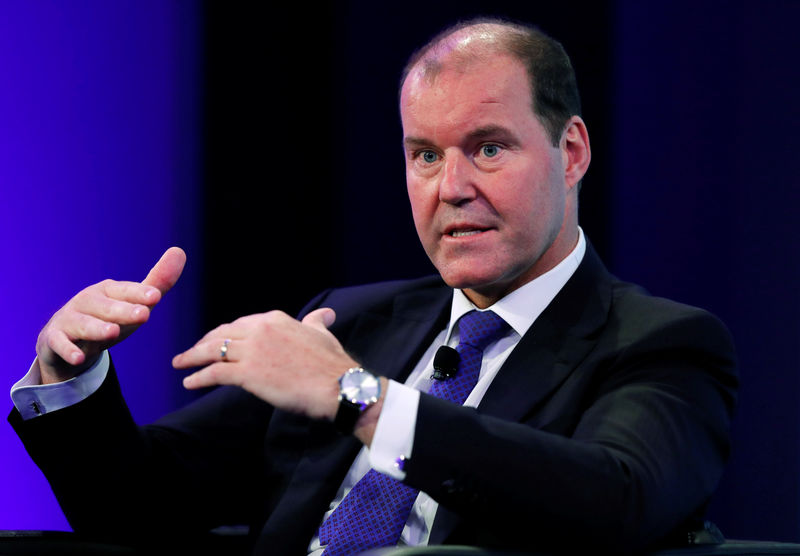By Ben Hirschler
LONDON (Reuters) - For Christophe Weber, the boss of Japan's Takeda Pharmaceutical (T:4502), securing a $62 billion deal last week to buy drugmaker Shire (L:SHP) at the fifth time of asking was the easy bit.
Now he has to steer what will be one of the world's most indebted drugmakers through the big spending cuts needed to make the financial sums work, without destroying the lifeblood of future innovation.
At the same time he must win shareholders' support for the largest-ever overseas purchase by a Japanese company - something he told Reuters could be helped by bringing in one or more long-term, large strategic investor.
Talks on this were now starting, he said, but declined to identify the parties involved.
Weber said in a interview that his prescription for a smooth merger was planning, speed and a surgical focus on culling experimental drugs that fail to offer the high level of medical innovation demanded by cash-strapped insurers and governments.
"It's really important that we don't waste resource on assets that are moderately innovative. When you combine two pipelines you can be more stringent," he said in London, where he is meeting investors and analysts.
Takeda will either dispose of programs that don't make the cut or spin them off into separate biotech companies in which it could retain a stake, the latter being a strategy is has pursued around 10 times in the past, Weber said.
It is a delicate task. For the past decade, ramming together two drugmakers in mega-mergers has been unpopular, following the R&D disruption caused by past deals like Pfizer's (N:PFE) acquisition of Wyeth in 2009.
Indeed, Frenchman Weber has direct experience of one such deal that fell short of expectations after working at GlaxoSmithKline (L:GSK) when it was formed in 2000 by the combination of Glaxo Wellcome and SmithKline Beecham.
"It's very important that we keep the momentum and don't get disrupted," he said. "We rely on R&D to grow."
'LESS DISRUPTIVE'
Takeda struck the agreement to take over London-listed Shire on May 8, a deal that will propel the Japanese company from a mid-size pharma player into the top 10 rankings of global drugmakers by sales, alongside the likes of Novartis (S:NOVN) and Pfizer (N:PFE).
Days later, Weber appointed U.S.-based executive Helen Giza to oversee overall integration of the enlarged group, which will be tightly focused on gastroenterology, neuroscience, oncology, rare diseases and blood-derived therapies.
There is a big cultural divide to bridge. Takeda is a 237-year-old Japanese institution that began life selling traditional Japanese and Chinese herbal medicines, while Shire was born above a shop in southern England in 1986.
But Weber believes he has a key advantage because Shire has been focused on later drug development, rather than early research, so there is no large research center that needs to be closed. "I think it will be much less disruptive than in typical M&A because of the research set-up," he said.
A key testing ground for the merger will be in Boston, a global hub of life sciences research, where both Shire and Takeda have large teams that must work seamlessly once the deal closes in the first half of 2019.
Takeda has forecast annual cost synergies of at least $1.4 billion three years after the deal closes, including $600 million in R&D costs, achieved by cutting duplication and rationalizing research programs.
Weber said savings would be helped by the fact that R&D investment in certain established Takeda drugs was now winding down. Still, $600 million remains a big bite out of two companies' current combined R&D spend of $4.4 billion.
"They are cutting quite deep in R&D and it is not clear if the amount of money they are saving is going to be beneficial or harmful," said John Rountree, a partner at pharmaceutical strategy consulting firm Novasecta.
"Merging R&D is never easy. There are going to be lay-offs and that creates uncertainty and disruption and sometimes the best talent just leaves."
Takeda expects to reduce the overall workforce of 52,000 by 6-7 percent, with R&D accounting for just under a third of the cuts. Weber said he recognized the risk of losing key staff and his team was currently working on a staff retention program.
FINANCING FEARS
Many investors have been lukewarm on the Shire deal because of the debt Takeda is taking on and uncertainty over how it will convert a $31 billion bridge loan into long-term financing.
Takeda has promised to bring the net debt of the enlarged group down to two times EBITDA within three to five years, from 4-5 times when the deal closes, and believes it can do this without significant disposals or shareholder dilution.
"In the refinancing mechanism we will use a lot of different instruments but none of them are dilutive," Weber said.
Weber said he had never doubted he would persuade investors of the case for the transaction but he acknowledged there had been "uncertainty and misunderstanding" initially. More recently, investor comfort with the deal had improved, he said.
The real test will come later this year when Weber will learn if he has secured the necessary two-thirds support needed from Takeda shareholders and three-quarters backing from Shire investors.
One Japanese institutional investor who owns Takeda shares said there were some fears the deal would overstretch Takeda’s finances but the benefit from business synergies should outweigh this. "We hope Takeda will provide a good explanation to the market and ease the investors concerns," he said.
Adding strategic investors could help alleviate some of those worries, potentially mirroring Bayer's (DE:BAYGn) recent deal to raise $3.7 billion towards its planned takeover of Monsanto (N:MON) by selling a stake to Singapore's state investment company Temasek.
"There are multiple possibilities of long-term investors, such as government funds or others," Weber said. "A long-term, strategic, stable investor would be great for us."
